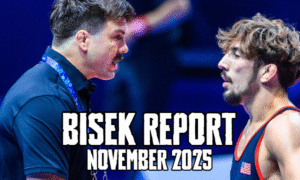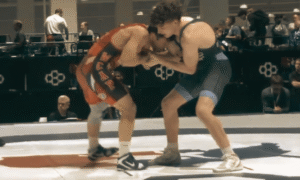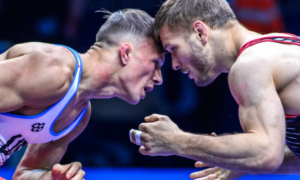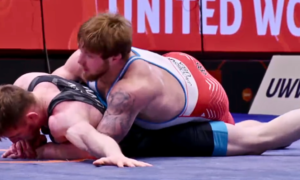Part of what makes Alex Sancho (66 kg, NYAC-OTS) successful is his complete lack of pretense. There is no glossy fiberglass facade to chip through. All that shall be revealed is already right in front of your face. That’s because Sancho is laid back. Casual. Unassuming. He is comfortable enough with his lot in life to tell you exactly what he is thinking about without ever having to waste words in the process. You won’t sense any overrun egotism in Sancho’s responses because truth be told, he is really not all that worried about impressing you with what he says.
What happens on the mat is a different story. Over the last few years, Sancho has established himself as one of the premier Greco-Roman wrestlers in the country. A student-athlete at Northern Michigan University, Sancho has come up through the ranks the hard way — by learning step-by-step what it takes and applying those lessons each subsequent opportunity. Big wins over big names in big spots provided the initial evidence progress was being made. It has been that way ever since. The medals have piled up. Even just recently, Sancho earned a silver at the 2017 Dave Schultz Memorial, his second in a row.
That is part of the story, too. He has been a runner-up more times than he probably cares to remember, though it’s not something he tries to hide from nor wants to. There are no secrets in this corner of the earth. Sancho wants to make a team. Needs to make a team. And he doesn’t take solace when you suggest he is still plenty young. If anything, he bristles at the implication age is a factor and why shouldn’t he? With undeniable gifts and an impressive Senior career already carved out, he has valid reasons for such expectations.
Sancho will get another crack at becoming a World Team member this coming April. The US Greco Roman World Team Trials will go down in Vegas, the sight of some of the 22-year old’s most memorable battles. Naturally, he’ll be considered a favorite. But before that happens, Sancho will be traveling to Denmark and Croatia as part of an expansive delegation of American athletes. More foreign opponents means more chances for the Miami native to refine his skill-set ahead of the main event a month later.
We caught up with Alex Sancho to get a bead on what he’s been up to lately and also, how he’ll be approaching the next two months. You will be entertained.
Alex Sancho — 66 kg, NYAC-OTS
5PM: You have established yourself in a big way and yet, you’re still quite young. Has any of your success so far surprised you?
Alex Sancho: Not really. You guys call me young, but I’ve been in the game for five or six years already. I’ve been around. I feel like I got my ass whupped a few times the first couple of years and now I’m starting to get the hang of it. I’m doing better in the game, you know? I just have to keep going.
At the Schultz, I wrestled three guys, Travis (Rice) and some kid from the Army (Robert Zyko) and I remember thinking about the rules and wondering if they were going to put me down in par terre the whole time. I thought they changed the rules for that tournament but they never did, so I was confused about the whole thing. When I wrestled the foreigner in the finals (Japan’s Tsuchika Shimoyamada), it was really weird because I hadn’t wrestled a foreigner in a while and I’m used to wrestling Americans. American’s don’t wrestle like foreigners, they have a different feel. So I was surprised with that in the finals, as well. I just have to keep on wrestling the way I wrestle, I don’t know.
5PM: Has there ever been a loss you walked away encouraged by after the fact?
AS: Encouraged? I don’t know, I think I’m disappointed by all of my losses, to tell you the truth. Hmmm, a loss. Does it have to be a recent one?
5PM: Of course not.
AS: With the Japanese guy I was disappointed and happy at the same time because I felt like I got that feel again wrestling foreigners. Foreigners are just really different than American Greco-Roman wrestlers.
5PM: Everyone talks about the “feel” of wrestling foreigners. Do you like the fact that your last two competitions before the World Team Trials are overseas tournaments?
AS: Yeah, I do. Because I get to wrestle with foreigners again and learn a little something while I’m there. My biggest pet peeve that I am trying to get out of this tournament is opening up myself, because I know foreigners are really open. They like to open and that’s how they control the whole match. And once they get that position, they attack and throw you. That’s what I want to do, that’s what I want to learn, that’s what I want to get good at. So I think me going to Croatia and Denmark, I want to improve in those aspects and apply it at Trials. And I’m going there to win, I have the tournaments, as well. It’s a double standard. I’m tired of taking second. I’m tired of it. I need to do something and start winning in the finals.
5PM: How would you explain to someone the difference between wrestling an American and wrestling a foreigner? From a technical aspect, what do you notice?
AS: Greco is just a weird style of wrestling. Out of the three, freestyle, folkstyle, and Greco, Greco is more of a foreigner’s sport. They have been doing it all their lives. As Americans, we start doing this after college, in our 20’s.
You have to get strong for the sport. It’s not just a technical sport, it’s very physical, as well. Wrestling a foreigner, in my view, is different than wrestling an American because they like to open more and attempt throws whereas Americans are very conditioned, like to throw in underhooks, stay in that position or wait for par terre or wait for those passivity points. Foreigners like to finish the match really fast and keep on continuing to wrestle. It’s a different feel.
5PM: When you train, are you pushing yourself to beat guys from other countries? You hear this a lot from US athletes, “I’m not training to beat the best Americans, I’m training to beat the best foreigners”, whomever that may be. Is that the kind of mindset you have to have?
AS: That’s the kind of mindset you want to have, but you have to keep in mind that you have to win the World or Olympic Trials first. You have to take one tournament at a time. It is always good to have that goal, I want to become a World Champion, I want to become an Olympic Champion, but you have make the World team, you have to make the Olympic team. You have to train for those guys, too. You have to train for the Americans first before you start training for the foreigners.
5PM: They took par terre out and now it seems they are putting it back in. That is something you are game for, correct?
AS: Yes, it is one of my strongest assets. I was super rusty at the Schultz, my par terre game. In the finals, I tried lifting Japan and I was just going through the motions and not thinking, just going with it. I was really rusty because I haven’t really been training my par terre lately because there is no more forced par terre. Now that there is, I’ve actually been doing it a lot more in practice and working on my defensive game. It’s going to definitely come into play in Denmark and Croatia.
5PM: What do you think about match flow? It seems like taking it out sort of had the opposite effect.
AS: Definitely.
5PM: Even overseas, a lot of matches have been a little too clinched up.
Alex Sancho: It made the sport a little boring, to tell you the truth, especially in America. Par terre is one of the biggest things (about Greco). I feel like with Greco, there are a lot of throws. I love throws, I love headlocks, I love bodylocks, I love arm throws, all this stuff, and when it comes down to par terre it’s just you trying to manhandle the other guy down onto his back and throw him, you know?
5PM: I think it was surprising that a lot of fans felt that there would be more throws and more excitement. Now, the argument can be made that they didn’t give the rules a chance to evolve long enough. But it also seems like par terre offers an element of excitement that sometimes needs to be forced.
AS: Yes, definitely. I feel like as an American, I know a lot of people when the referee tells someone to get down in par terre, the audience could be really confused about the point system and how is the guy is lifting him off the mat. But it’s really spectacular and I like that and I feel like that is one of the things that improves the sport of Greco in America, getting the name out there. I like par terre.
5PM: If you had to pick one, what do you think is your biggest win so far?
AS: Tournament or individually?
5PM: It doesn’t matter, anything you want it to be.
AS: I think my biggest win in my Greco career was probably at the Olympic Trials wrestling Ellis Coleman. That really motivated me a lot and it told me that I could be one of the top guys that entered the level of a world champion and all that. That was probably one of the biggest wins.
5PM: And then you wrestled Coleman again in November and you beat him rather decisively.
AS: I got him down in par terre and I tech’ed him.
5PM: When you beat Coleman in New York, did that solidify your perspective even more? Did it embolden you further?
Alex Sancho. Yes. Throughout the whole tournament I felt really good. Wrestling Coleman, I kind of felt him out that first 20 seconds of the match and I could tell I got really strong for that tournament and my technique was there. I felt really comfortable in positions and that win at the Olympic Trials last year gave me the confidence that I could beat this guy again and continue to the finals. Once I got down to that par terre, I lifted him twice and ended up winning the match. It felt pretty good.

Sancho (red) attempts to lift Shimoyamada (JPN) in the finals of the 2017 Dave Schultz Memorial International. (Photo: John Sachs)
5PM: What was your first attraction to Greco? Was it the throws and the dynamic moves?
AS: When I was young I started doing Judo in second grade, third grade. My dad got me into it and it’s like Greco pretty much, just with a gi on. It’s like the same thing in Greco, you’re throwing people, it’s upper body, and stuff like that. I’ve always liked that and I got into wrestling folkstyle. Halfway through my freshmen year of high school, I was playing basketball at the time and I told my basketball coach that I used to do Judo. He wound up asking the wrestling coach if I could join because I wasn’t that good at basketball (laughs). I was just really short.
The coach kept on me, asking me to come to practice. I was like, I don’t want to do that. And then I ended up going and I was just throwing the kids around. I ended up wrestling in high school after that, placing at states, going to states three times, and I went to Fargo. I actually got introduced to Greco by Nestor Varona, Isaiah Varona’s father. He’s one of the Greco guys in Miami, he owns a garage down there and I used to wrestle his son all the time in matches and he told me, “You should do Greco” and stuff like that.
Then I went to Fargo and saw Greco first-hand and I fell in love with it. After high school, I graduated Northern and here I am. I won a Judo national title my first year, won a Judo national title my second year, made a World Team. I loved it.
5PM: I think a lot of people sleep on Florida. There is a good amount of tough Greco wrestlers from Florida every year, especially at the age-group level.
AS: Oh yeah. We have Nestor. He used to be a coach for the US or something back in the day, I don’t know. He has trained his son (Isaiah) all his life. He has this garage down there he trains Greco in, it’s pretty cool. Recruits a bunch of kids to Northern. He’s a super nice guy.
5PM: I don’t know what your ambitions are like outside of wrestling. I ask this question a lot and you just seem like the perfect dude to ask this question to, but if there are kids in your future, are they wrestlers?
Alex Sancho: Definitely, 100% (laughs). There is no crying, no whining, I don’t care, they’re wrestling (laughs). That is just the way I grew up. My dad was a super hardcore Judo guy. He would always force me to go to practice when I didn’t want to go and then after practice I’d be happy because I went and I did what I had to do, and it was fun. I liked doing it.
5PM: That’s interesting because I do have children and the only reason I would want them to wrestle is because of the values, the self-reliance that are tough to find anywhere else. It’s not so much the competition.
AS: The things you do, the people you meet, the disciplinary aspect. It’s a beautiful sport. I love it. But it’s not for everybody. I’ve seen hardcore parents tell their kids to go to practice and they ended up not liking the sport. I don’t know. It’s different for other kids. I guess some kids don’t have the right mentality for the sport and some kids do. It’s really hard.
5PM: So far in your career, what has been your favorite place to travel to?
AS: My favorite place to travel? Probably Cuba, man. I have like half my family there. It was really nice going over there and competing. And the training there is really crazy. All they have is a pull-up bar and fricking rocks. The weather is beautiful there, the girls are beautiful there (laughs). It’s one of my favorite spots. I definitely would love to go back over there and train for a little bit sometime.
5PM: I remember during the Rio Olympics there was a photo going around of the Cuban training facility and it was rather meager. I’ve seen home gyms that have looked nicer but it doesn’t seem to make a difference to that country’s competitors.
AS: It’s just the way they train, the mentality they have is just pride of being a Cuban Greco wrestler. I’ve talked to a couple of them and they just have so much pride. They are so confident in their sport and that is why they do so well and it’s what I’m trying to do.
5PM: I’ve gotten to know you a little bit and if I were to describe you to somebody, I’d say that you’re just a no-nonsense, unpretentious kind of guy. Easy to talk to. But you have carved out a place as an extremely successful competitor so far. Of course it takes all kinds, as they say, but is there some kind of attitude, some kind of mindset you have to get yourself into prior to an event?
AS: You definitely have to have a mindset but first, you have to put in the work. You have to put in those after-hours. Once you work out and you get stronger, you do your technique a thousand times, you’re confident in your throws and positioning, and you’re overall confident in your wrestling, you could have that mentality. You have to put in the work before you earn that mentality. Because if I never put in the work, then I wouldn’t have that mentality that I could be the best in the US, that I can compete with these guys. Then I’ll feel like shit at a tournament, like I didn’t put in the work to win this or place high in the tournament. It just wouldn’t be there.
5PM: If that something you discovered on your own or is it something you were taught?
AS: Something I discovered on my own. Just traveling a lot, meeting other people, listening to them, and it just clicked in my head.
5PM: You just had Schultz two weeks ago and two weeks from now you head to Europe for two events and a camp. Does your training change at all as you approach crunch time here? It’s two events back-to-back and then a little over a month later is the World Team Trials. Do you adjust your training at this point for what’s coming up?
AS: Not really. I’m still doing my lifts. I’m working out three times a day. I’m wrestling twice a day, lifting, and going to school. I try to get as much as I can out of each practice and going hard, going 100%. When it comes down to a week, week and half before a tournament, then I start tapering down and stop lifting. Two weeks before the Trials I am definitely going to stop lifting. Now that I am going to Denmark and Croatia, I’m just going to keep on lifting and then once I get over there I am going to stop lifting and just wrestle the whole time. I taper down. I’m definitely going to taper down before Trials, not lift and just focus on my technique and my repetitions, stuff like that. But for Denmark and Croatia, I’m going hard right now.
Follow Alex Sancho on Twitter and Instagram to keep up-to-date on his training and competitive schedule.
















